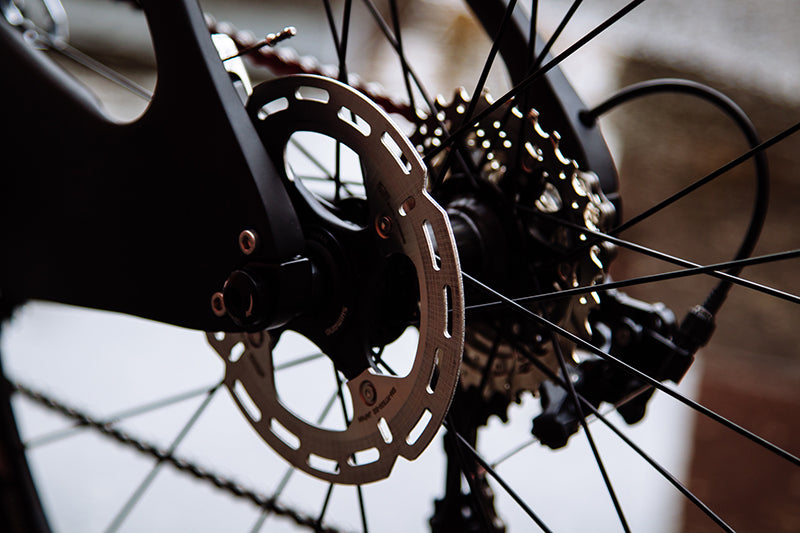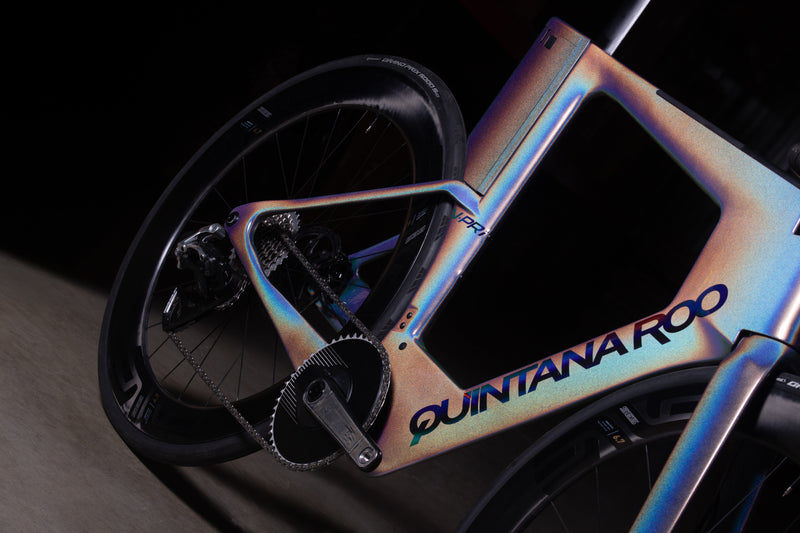THE ADVANTAGES OF DISC BRAKE BIKES

Triathletes are making the switch to our disc-brake PRsix2 and PRfive2 triathlon bikes, as well as our aero road bikes. Learn the benefits of disc brakes and if there are any disadvantages - plus read reviews from QR professional athletes who've switched to disc-brake PRseries bikes.

WHAT ARE THE BENEFITS OF DISC BRAKE WHEELS?
Stopping Power
With disc-brakes there is no shortage of stopping power. For many years, motorcycles have relied on the consistent and reliable stopping power of disc brakes. When compared to rim-brakes, disc brakes allow the rider to apply much less force to the lever while stopping. The largest benefit of increased stopping power is increased safety on the bike. Less force required on the lever can also be beneficial on longer descents where your hands might fatigue from the need to apply a high level of consistent stopping power.
Control / Modulation
You can experience inconsistent stopping power with rim-brake systems, especially in wet conditions. When using disc brakes, the amount of stopping power applied is consistent throughout the operation of the lever and is the same each time you use the brakes. This allows you to establish more confidence in your brakes, as you are able to accurately predict how much force to apply on the brake lever in each and every stopping situation.
Weather
Operating rim-brakes in the rain typically results in a few second delay before you start to decelerate. This is because the brake pad is required to displace water on the rim surface before a necessary amount of friction can be applied by the brake pads to slow you down. If you need to stop, and haven't "scrubbed" your brake surface first, you may be put into a potentially dangerous situation - especially if you need to take a sharp corner or stop quickly. On long descents in the rain you may need to apply a very large amount of force to the levers in order to get the bike to come to a stop.
Delamination & Wear
The carbon brake track area of a rim-brake wheel is typically reinforced and designed to dissipate the heat generated during hard braking. Riding the brakes on long descents with carbon rim-brake wheelsets can result in overheating and failure of the wheel. Additionally, the friction applied by the brake pads to stop the bike wears down the carbon brake surface. It is inevitable, that over time, the carbon brake-track on rim-brake wheels will wear out. This doesn't happen quickly, however, your riding style and terrain can play a factor in the overall lifespan of the wheelset. With disc-brake carbon wheels there is no worry of overheating or brake-track wear as the braking surface is moved to the disc rotors.
Increased Stiffness
Disc-brake bikes typically utilize what are called thru-axle dropouts. Thru-axles are stronger and securely hold the wheel in place. This results in a noticeable increase in overall bike stiffness.

ARE THERE ANY DISADVANTAGES?
Sounds like a lot of great advantages but what's the catch? While there are no major disadvantages to switching to disc-brakes, there are some potentially minor ones. Disc-brake components do add a few extra grams of weight to the bike but at typically half of a pound or less, does this outweigh the benefits? It's been proven that the largest weight saving benefits come in the form of rotational weight. By removing the brake track surface, carbon wheelset manufacturers are now able to reduce rotational weight of their disc brake wheels and achieve new designs that are even more aerodynamic.
Speaking of aerodynamics, disc brakes are widely referred to as not being aerodynamic. In fact, there are wind-tunnel tests that show disc-brakes are more aerodynamic at almost all yaw angles than standard direct mount brakes. It doesn't take a wind-tunnel to look at the frontal plane of a PRsix2 and notice how cleaner the bike is without the rim-brake caliper.
One of the biggest drawbacks, if you've established a nice collection of expensive rim-brake wheelsets, is that any rim-brake wheels you have are not going to be compatible with a disc brake bike.
ATHLETE REVIEWS

Matt Hanson
IRONMAN North American Champion & IRONMAN World Record Holder
"I have been really happy with the upgrade to the PRsix Disc. It gives me an added level confidence in braking in all conditions. Riding the fastest wheels in wet conditions used to require me to brake early because you didn’t know how long it would take for the bike to actually start to slow down - definitely not the case with the disc brakes. This also allows me to carry more speed into corners and brake later than I would with standard brakes.
I am also impressed with how easy it is to swap between training and race wheels. The brakes are easily adjusted when necessary. QR did a great job with this design by increasing function without sacrificing aerodynamics."

Kelly Fillnow
Quintana Roo Professional Triathlete
"I've had plenty of chances to test the brakes. I felt so much safer doing sharp turns and I really liked the more predictable braking experience. I also have had quite a bit of races in the rain, and knew the disc brakes would help with wet conditions. I had a pretty bad accident in a race in wet conditions, I went a little too aggressive and ended up wrecking, so I loved the consistent stopping power and noticed that immediately.
I recently did over 7k of climbing in Blowing Rock, NC and used the brakes way less, while staying aero longer, because I felt much more confident I could stop when needed. This will give me a lot more confidence on race day as I can make up more time on the descents. I also love how the cables are rerouted so everything is super clean, improving the aerodynamics even more."
SHOP PRSIX2 DISC & PRFIVE2 DISC


